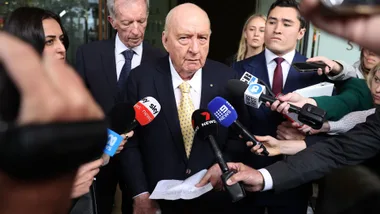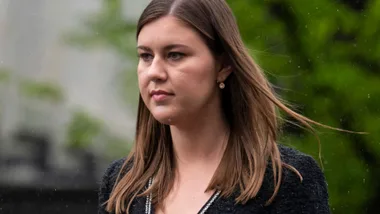In case you haven’t noticed, women are angry. We’re angry because it feels like the tragic news just won’t stop.
Over the past several weeks we’ve seen an allegation of rape inside Parliament House and a historic sexual assault allegation levelled against a man in one of Australia’s highest positions of office. The global news has been flooded with Sarah Everard’s murder, and the violent response of police following a vigil held in her honour in London, as well as the brutal targeting of Asian women in Atlanta overnight, which saw six women murdered in a shooting spree.
Everywhere we turn, there’s a different depiction of gendered violence and it feels like a vicious cycle running on repeat.
So, when NSW Police Commissioner Mick Fuller suggested the state needed to modernise ideas around “positive consent” and proposed the idea of using modern technologies to better protect women, it felt like maybe things could be pushing forward.
“Intimate violence particularly against women is a real problem crime for us at the moment and we need to find a solution,” he told ABC Radio Sydney.
Fuller’s idea came in the form of an app, similar to the government’s COVID tracking app, which sees patrons ‘check in’ to track consent between sexual partners.
While a police official attempting to combat sexual violence in Australia is always welcome and I believe Fuller’s intentions were good, it feels, yet again, like no one is listening to what we actually need.
Infuriatingly, the app presents the possibility of placing more responsibility and blame onto women in these situations, a rhetoric we’ve seen play out in recent weeks.
The NSW Police suggest the app that would allow two people, before they get intimate, to log in and agree with a digital contract, of sorts.
There’s one glaringly obvious problem. Sexual consent is a complex concept, and whittling it down to a black-and-white set of rules is impossible.
The proposed idea doesn’t acknowledge that consent can be taken away at any point, and the app could, in turn, make women feel like they’ve signed an unbreakable agreement.
Chanel Contos, the former student whose petition revealed thousands of teenage sexual assault claims earlier this month, called out the idea as a “bad Band-Aid” solution to Australia’s overarching sexual assault crisis.
“Consent can be taken back at any time, and an app couldn’t account for that,” Contos told the Sydney Morning Herald. “It’s very reflective of how consent is seen; as a black and white thing. But consent isn’t a single sentence. It’s how people interact with each other as a whole.”
“I do appreciate the sentiment. But we’re at a pivotal moment – we’re about to create serious change – so we have to seriously consider how to do it,” she added. “Every solution will have backlash. We have to look to best practice [and] any decision has to be sustainable and as forward-thinking as it can be.”
There’s no denying that alcohol and other substances can also play a part in sexual consent, so having a potentially impaired sexual partner asked to ‘check in’ as a means of consent opens up plenty of potential risks, which is admittedly something Fuller and the NSW Police did take into account.
“A number of the matters that we see involve the victims being impaired, they are often nearly unconscious. I think it would be pretty tough to get someone to [make a statement] on an app in that case,” Fuller said.
There’s also the issue of women being forced, persuaded, and coerced into signing a digital document that could potentially be used later as “proof” that they had consented.
It’s yet another example of a decision that is being proposed within our government that does not reflect the women it will have an immediate and direct effect on.
On March 17 a new federal government scheme was announced that would allow domestic violence survivors to withdraw thousands from their superannuation to fund their own crisis response.
The policy was meant as a “compassionate measure” to help aid those trying to escape violent situations, but considering we, as women, retire with less than half the superannuation of men, the decision, announced in a week that saw the #March4Justice protests, proved again that responsibility often gets placed on the backs of victims.
It’s great to see those in power actually making attempts to curb gendered violence. But these decisions—the ones that are created to protect us, but in actuality open us up to potential risk—need to be made with us at the table.










